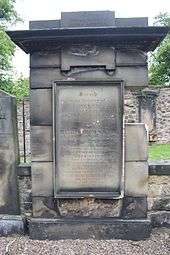James Spittal
Sir James Spittal (1769–1842) was a Scottish silk merchant who was Lord Provost of Edinburgh 1833 to 1837. Spittal Street in the west of Edinburgh is named after him. He was a strong Whig politician who campaigned for election reforms to increase democracy.[1]
Career
The name James Spittal does not appear in Edinburgh street directories until 1810, when he is listed as a haberdasher with a shop at 55 South Bridge, living at 59 South Bridge.[2] Spittal later ran a successful silk and shawl shop at 12 St Andrew Square in Edinburgh’s New Town.[3]
In September and October 1815 James junior took a tour of Europe, which he documented in a diary. This appeared to concentrate on sites connected to the Napoleonic Wars.[4]
He stood for election as Lord Provost of Edinburgh in 1833 in succession to John Learmonth of Dean. He stood against James Aytoun (an advocate and uncle of William Edmondstoune Aytoun) in the important first election following the Burgh Reform Act of 1833. In the election campaign of 1833 there were both pro-Spittal and anti-Spittal election songs created. The pro song was entitled "Huzza for Provost Spittal". Unsurprisingly the opposing song was "Huzza for Provost Aytoun". The song alludes to his having recently purchased a country house called Justice Hall in Lauder in Berwickshire from James Justice Esq.[5] At this time he is living separate from his family at 11 Nicholson Square in south Edinburgh.[6]
He was succeeded as Lord Provost by Sir James Forrest, 1st Baronet of Comiston. Whilst serving as Provost he was painted by John Watson Gordon, a copy of this painting by David Alison (1882-1995) is held by the City of Edinburgh Council.[7]
Personal life

He was the son of James Spittal senior as his name appears as James Spittal Jr in some documents.[8]
He was married twice: firstly to Marion Brown (1772-1824) and secondly to Lady Mary Wightman Ker Spittal (1799-1862), thirty years his junior.
Children of the first marriage included James Spittal (1797-1844). Joseph Mack Spittal, Dr Robert Spittal FRSE ( d.1852). Helen (1800-1812). Marion (1805-1893) married Dr John Taylor FRCPE (1805-1856) and is buried with him in Dean Cemetery.[9]
Children of the second marriage (c.1825) were Elisabeth Ker Spittal (1827-1841) and John, later Rev John Spittal, who was only nine years old when James Spittal died. His granddaughter Etheldred Spittal married Percival Stacy Waddy.
He died at home, 3 Minto Street[10] in south-east Edinburgh on 25 September 1842. He is buried in Greyfriars Kirkyard.[11] The grave lies within the western extension.
References
- "Reverend John Spittal MA 1869-70 — University of Leicester". le.ac.uk. Retrieved 27 March 2017.
- Edinburgh and Leith Post Office Directory 1810-11
- Edinburgh Post Office Directory 1840
- "The adventures of James Spittal". lothianlives.org.uk. 25 September 2015. Retrieved 27 March 2017.
- "Broadside ballad entitled ' Huzza! for Provost Spittal!!! An Excellent New Song'". nls.uk. Retrieved 27 March 2017.
- Edinburgh and Leith post Office directory 1833-34
- "Sir James Spittal (1796–1842), Lord Provost of Edinburgh (1833–1837)". artuk.org. Retrieved 27 March 2017.
- Edinburgh and Leith Post Office Directory 1833-34
- Grave of Dr John Taylor, Dean Cemetery
- Edinburgh and Leith Post Office directory 1841-42
- Sale, Charles. "Helen Spittal grave monument details". gravestonephotos.com. Retrieved 27 March 2017.